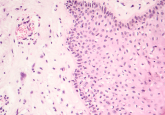Esophageal and stomach cancers detected by novel breath test

A study presented at the 2017 European Cancer Congress (27–30 January, Amsterdam, The Netherlands) has demonstrated that a new breath test has 85% overall accuracy when detecting esophageal and stomach cancers. Currently, diagnosis is difficult as the symptoms for stomach and esophageal cancers are ambiguous, but the new test holds promise for non-invasive diagnosis.
Sheraz Markar (Imperial College London, UK) commented: “At present the only way to diagnose esophageal cancer or stomach cancer is with endoscopy. This method is expensive, invasive and has some risk of complications. A breath test could be used as a non-invasive, first-line test to reduce the number of unnecessary endoscopies. In the longer term this could also mean earlier diagnosis and treatment, and better survival.”
The new test trial was based on previous research that highlighted the different levels of five specific chemicals – butyric, pentanoic and hexanoic acids, butanal, and decanal – in individuals with stomach or esophageal cancer and healthy controls. The research was continued in this new study, which tested whether the specific chemical signature could be part of the diagnostic process.
Of the 335 breath samples collected, 163 had been diagnosed with esophageal or stomach cancer and 172 demonstrated no evidence of cancer. Selected ion flow-tube mass spectrometry was utilized to analyze and measure the concentration of the chemicals in breath, with the aim to find a chemical signature associated the cancers.
The results indicated 85% overall accuracy, with a sensitivity of 80% and a specificity of 81%. Markar commented: “Because cancer cells are different to healthy ones, they produce a different mixture of chemicals.
“This study suggests that we may be able detect these differences and use a breath test to indicate which patients are likely to have cancer of the esophagus and stomach, and which do not. However, these findings must be validated in a larger sample of patients before the test could be used in the clinic.”
In the future, the researchers hope to continue with a larger trial and conclude whether the breath test could be used for other types of cancer, for example pancreatic and colorectal.
Source: S. Markar et al. Breath volatile organic compound analysis for the diagnosis of esophago-gastric cancer; multi-centre blinded validation clinical trial. Proceedings of the European Cancer Congress. Amsterdam, The Netherlands, 27–30 January 2017.



